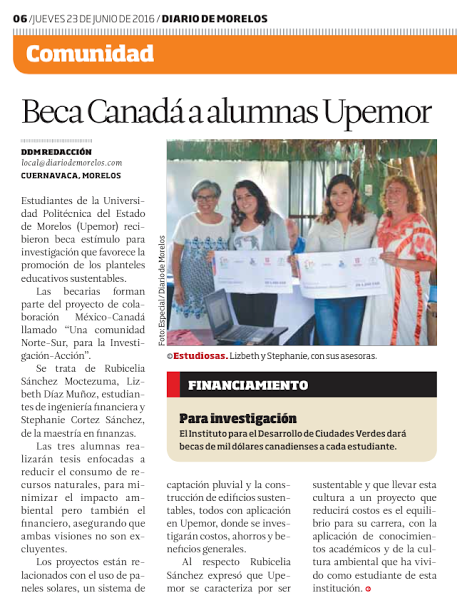Student Research
Student research is an important part in the Sustainable Campuses Initiative. Undergraduate and graduate students from our partner Mexican universities are carrying out research as part of their undergraduate and graduate theses. The student research is characterized by its applied nature. All of the projects have as an objective to explore problematics linked to campus sustainability at the students’ own campus. Many of these projects use a participatory action-research approach. The Sustainable Campuses Initiative supports these students through scholarships and by providing small funding for campus sustainability projects. Furthermore, students are engaged in different forums where they are encouraged to share their knowledge with members of their educational communities and that of the other institutional partners. Here is a description of the different theses projects that have been funded through the SSHRC funds.

English translation follows
Lizbeth Díaz  Muñoz, Ingeniería Financiera
Muñoz, Ingeniería Financiera
Universidad Politécnica del Estado de Morelos.
Correo: dmlo139454@upemor.edu.mx
Estudio de factibilidad para la instalación de paneles solares en la Universidad Politécnica del Estado de Morelos, 2016
Resumen
Para la elaboración de un proyecto de investigación es necesario, identificar las diversas problemáticas que cualquier institución enfrenta, en este caso se analizaron diversas deficiencias presentes en la Universidad Politécnica del Estado de Morelos (Upemor), dentro de las cuales fue notable el excesivo egreso o desembolso de dinero por parte de la institución por el uso de energía eléctrica, además, de que el uso de este tipo de energía causa daños al medio ambiente por la emisión de gases del efecto invernadero, los cuales surgen por la quema de combustibles fósiles que se utilizan a fin de generar esta energía. Por ende fue que la propuesta de implementar paneles solares surgió, puesto que el generar energías alternativas disminuye considerablemente el daño al medio ambiente, sin embargo, antes de implementarlos es necesario realizar un estudio de factibilidad financiera y un estudio técnico que den a conocer los beneficios y los alcances que, este proyecto otorgara a la Upemor y otras instituciones educativas que se interesen por el mismo.
Con el objetivo de llevar a cabo este proyecto y debido al poco conocimiento que poseía acerca de lo que es la sustentabilidad y la forma en que se podría vincular con las finanzas, fue necesario realizar una serie de investigaciones y/o lecturas acerca de ambos temas, además de analizar teorías que con anterioridad fueron creadas a fin de realizar otros proyectos similares. También, fue necesario solicitar información histórica en relación al consumo y el costo mensual por energía eléctrica en la Upemor, y analizar los espacios disponibles para los paneles, todo eso para tener un panorama de la capacidad que la universidad posee para implementar este proyecto y la factibilidad que poseerá a la hora de que se lleve a cabo.
Palabras clave: Energía eléctrica, medio ambiente, gases del efecto invernadero, paneles solares y factibilidad financiera.
TITLE: Feasibility study for the installation of solar panels at the Universidad Politecnica del Estado de Morelos, 2016
Abstract
For the preparation of a research project necessary, identify the various problems that any institution faces in this case various deficiencies present were analyzed at the Universidad Politecnica del Estado de Morelos (Upemor), within which was notable excessive discharge or outlay of money by the institution for the use of electricity, moreover, that the use of this type of energy causes damage to the environment by the emission of greenhouse gases, which come from burning fossil fuels They are used to generate this energy. Thus it was that the proposal to implement solar panels arose, since the generating alternative energy significantly reduces the damage to the environment, however, before implementing them it is necessary to conduct a financial feasibility study and a technical study to disclose the benefits and the scope that this project will give the Upemor and other educational institutions that are interested in it.
In order to carry out this project and due to the little knowledge he possessed about what is sustainability and how they could be linked with finance, was necessary to conduct a series of investigations and / or reading about both topics besides analyzing earlier theories that were created to perform similar projects. Also, it was necessary to request historical information in relation to consumption and the monthly cost for electricity in the Upemor, and analyze the available space for the panels, all that to have an overview of the capacity that the university has to implement this project and feasibility possess when it is carried out.
Keywords: Electricity, environment, greenhouse gases, solar panels and financial feasibility.
 Rubicelia Sánchez-Moctezuma, Ingeniería Financiera
Rubicelia Sánchez-Moctezuma, Ingeniería Financiera
Universidad Politécnica del Estado de Morelos
Correo: rubsmoctezuma@gmail.com
Formulación y evaluación del proyecto de inversión para un sistema de captación de agua pluvial en Upemor, 2016.
Resumen
La Universidad Politécnica del Estado de Morelos en coordinación con el Dawson College de Canadá forman parte de los Planteles Educativos Sustentables en los que el cuidado del medio ambiente es el principal objetivo. Dentro del programa se incluyen proyectos de diversos temas en los que benefician no sólo a sus instituciones sino también al entorno. Gracias al convenio con estos planteles, surge la idea de realizar proyectos dentro de la universidad.
La realización de esta investigación comienza con el análisis de las problemáticas ambientales dentro de la Universidad Politécnica del Estado de Morelos; para ello se hizo una búsqueda entre los problemas actuales y como resultado se llegó a la escasez de agua. Es importante mencionar que este proyecto no busca eliminar al 100% este problema a nivel regional, sino reducir el consumo de agua potable dentro de la institucin, recordamos que para realizar los grandes cambios se comienza con las pequeñas acciones, por eso se decidió dar marcha a este proyecto.
En primer lugar se consultó la información necesaria para establecer los puntos estratégicos de colocación del sistema de agua pluvial. Se obtuvieron los planos de los edificios de la Upemor y con ello observamos que dentro de la institución ya se contaba con un sistema, sin embargo, se deshabilitó por falta de mantenimiento. El desconocimiento de temas ambientales fue un problema, así que se consultaron fuentes bibliográficas de temas afines para comprender a fondo el problema de la escasez y el uso irracional de agua potable.
Para iniciar la Tesina, se comenzó a establecer los objetivos de manera que se debía cumplir con un impacto ambiental y financiero, así mismo se definió la estructura de cada capítulo; dentro de cada uno se colocaron temas de sustentabilidad, acciones con otras instituciones para promover el cuidado del agua y el estudio de factibilidad financiera del proyecto de sistemas de captación de agua pluvial, esto último, para alcanzar el objetivo general del proyecto que es: Evaluar la factibilidad financiera del proyecto de inversión para la implementación de un sistema de captación de agua de lluvia en las instalaciones de la Universidad Politécnica del estado de Morelos a través del uso de herramientas tradicionales como Valor Presente Neto, Tasa Interna de Retorno y Periodo de Recuperación para determinar la aplicación del mismo.
Palabras clave: escasez de agua, agua potable, sistema de agua pluvial, impacto ambiental, factibilidad financiera.
TITLE: Formulation and evaluation of the investment project for a system of collecting rainwater in Upemor, 2016
Abstract
The Universidad Politécnica del Estado de Morelos in coordination with the Dawson College of Canada are part of the sustainable educational institutions in which environmental protection is the main objective. Within the program have projects of various topics that benefit not only institutions but also the environment they are included. Thanks to an agreement with these schools, appear the idea of carrying out projects within the university.
The realization of this research begins with the analysis of environmental issues within the Polytechnic University of the State of Morelos; for it was searched among the problems today and as a result was reached water shortages. It is important to mention that this project seeks not eliminate 100% this problem at the regional level but reduce the consumption of potable water within the institution, remember that to make big changes start with small actions, so it was decided to march this project.
First, the necessary information consulted to establish the strategic placement points storm water system. Plans Upemor buildings were obtained and thus see that within the institution already had a system; however, it was disabled due to lack of maintenance. Ignorance of environmental issues was a problem, so bibliographical sources related issues were consulted to fully understand the problem of shortage and irrational use of drinking water.
To start the Thesis, it began to set goals so that it would comply with an environmental and financial impact, also the structure of each chapter defined; within each sustainability issues, actions with other institutions to promote water conservation and financial feasibility study of the proposed collection systems rainwater is placed, the latter, to achieve the overall objective of the project is: Evaluate the financial feasibility of the investment project for the implementation of a system for capturing rainwater in the premises of the Polytechnic University of Morelos state through the use of traditional tools such as Net Present Value, Internal rate of Return and Recovery Period to determine the application.
Keywords: Water shortages, potable water, storm water system, environmental impact, financial feasibility.
 Stephanie Cortez Sánchez, Maestría en Finanzas y GestiónUniversidad Politécnica del Estado de Morelos
Stephanie Cortez Sánchez, Maestría en Finanzas y GestiónUniversidad Politécnica del Estado de Morelos
Correo: stephstephscs@gmail.com
Impacto económico de la implementación de tecnología sustentable en edificaciones de planteles educativos
Resumen
En esta investigación, se hace especial énfasis en el aspecto económico de la implementación de tecnologías que brinden confort a los usuarios de los edificios y que afecten en menor medida al medio ambiente que los sistemas que se emplean comúnmente en las edificaciones de escuelas.
Con el daño que se le hace día a día al planeta, sobrepasamos la su capacidad para regenerarse En el área de la construcción, arquitectos e ingenieros tienen la necesidad de implementar nuevas tecnologías que permitan tener un menor impacto ambiental, las cuales no solo dan resultados ambientales, sino que se buscan resultados económicos positivos.
El propósito es generar conocimiento sobre el beneficio económico que tendrá el implementar tecnologías sustentables desarrolladas con anterioridad por expertos, ya que actualmente se busca en distintas ramas reducir el impacto o daño al planeta y a su vez apoyar la economía.
La manera de lograrlo será identificando los factores que influyen en el alto consumo de energía, detectar los espacios en los que se puede adaptar la tecnología planteada y hacer un análisis comparativo de los efectos económicos que se obtendrán si se implementan.
Palabras clave: tecnología, medio ambiente, escuela, economía de la energía, agua, electricidad.
TITLE: Economic impact of the implementation of sustainable technology in buildings of educational institutions
Abstract
In this research, special emphasis is placed on the economic aspect of the implementation of technologies that provide comfort to users of the buildings and to a lesser extent affecting the environment than the systems that are commonly used in school buildings. With the damage that is done every day, the planet surpassed its capacity to regenerate. In the construction area, architects and engineers have the need to implement new technologies that have less environmental impact, which not only give environmental results, but positive economic results. The purpose is to generate knowledge about the economic benefit that will result by the implementation of sustainable technologies that where previously developed by experts.
The way to achieve this is by identifying the factors that influence high energy consumption, detect spaces that can adapt the proposed technology and make a comparative analysis of the economic effects that will be obtained if implemented.
Keywords : technology, environment, school, energy economy, water, electricity.


